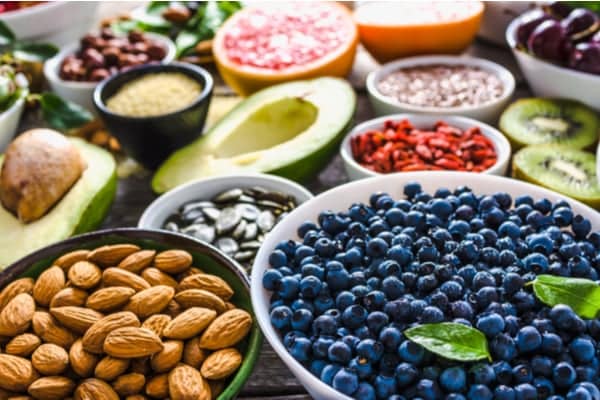If you were recently diagnosed with PCOS, or you want to try a more natural approach to balancing your hormones, there’s some good news for you. A study found a link between nutrition and hormones in women who weren’t medicated during the clinical trial.
In fact, the glucose tolerance test (OGTT) revealed positive changes after only 16 days of a low carbohydrate intake. It seems that what we put on our plate can dramatically impact our hormones.
If you want to find out more about what aspects of PCOS you can improve using nutrition, read on.
{{cta(‘8d04d88a-af3c-48b8-92c0-a0edcb8e1750’)}}
Eat Fat, Lose Fat
While experts don’t know for certain the cause of PCOS, insulin spikes, genetics, and low grade inflammation all contribute to hormonal imbalances and ultimately weight gain.
Insulin is the fat storing hormone, and since women suffering from PCOS develop insulin resistance, they gain weight faster than their healthy counterparts. The good news is that insulin simply reacts to our diet.
That means that if you eat a diet high in carbohydrates and low in protein and fats, you should expect insulin spikes. The more insulin spikes, the more fat your body stores. Fat and protein do not cause insulin spikes in the same way simple carbs do. As a result, the higher percentage of fat and protein, the more likely you are to lose weight.
The takeaway?
Don’t be afraid of eating healthy fats and lean meats. What you should restrict are grains and sweets. Aim for less than 100 grams of net carbohydrates per day.
Fighting Low-Grade Inflammation and Acne
The cosmetic industry is booming since so many women are desperate to find a cure to acne that doesn’t seem to go away after puberty. Unfortunately, many of us are looking for the cure in the wrong place.
If you’re suffering from PCOS and have acne, you should know that low-grade inflammation in your body is to blame, and no cream can help with that.
So, what can you do about it?
Remove inflammatory foods from your diet.
This includes any types of grains, processed or whole sweets, (you can still have dark chocolate), and dairy. There is actually a link between dairy and hormonal imbalances. In some people, the consumption of dairy triggers both inflammation and androgen production. While not all women who suffer from PCOS respond negatively to dairy, removing dairy for just 2 weeks can help you figure out if it’s the root of your breakouts or not.
{{cta(‘8c7c8cff-00e5-4cb0-844a-5352a5b5029f’,’justifycenter’)}}
Growing a Beard While Fighting Hair Loss
Hormones can be tricky!
Even a slight hormonal imbalance can stimulate hair follicles in unwanted places to grow longer, thicker, and darker. On the flip side, your locks might get oily and start shedding.
Nutrition can help in this case too!
High androgen levels cause abnormal hair growth and hair loss on the scalp. However, there are a few vitamins and minerals that contribute to the health of your hormones.
Women suffering from PCOS are known to also have a magnesium and vitamin D deficiency. Therefore, consuming foods rich in those vitamins and minerals can improve your condition. Zinc and iron also help preserving the health of your locks.
Adding more peanuts, walnuts, lentils, spinach, and eggs to your diet can allow you to address these deficiencies naturally.
Preventing Diabetes and Heart Disease
Unfortunately, PCOS is not just about aesthetics and fertility. It can also lead to more serious complications such as diabetes and heart disease. Inflammation and hyperglycemia feed the hormonal imbalance. If left untreated, hyperglycemia can turn into diabetes over time.
Preventing diabetes can be tricky. Unlike what most people tell us, if you’re suffering from insulin resistance, you shouldn’t eat that many fruits. A woman’s body that’s affected by insulin resistance is going to respond to an apple as if it were a Snickers bar.
While fruits are not forbidden, you should consume them with protein or fats.
Also, if you’re diagnosed with PCOS and suffering from insulin resistance, you should make sure you don’t go over 100 grams of carbs daily. Hyperglycemia can also elevate the number of triglycerides and increase the bad cholesterol.
Obesity is one of the factors that increase the risks of heart disease. But at the same time, your metabolism slows down when your hormones are disrupted. This is why nutrition plays a big role in the prevention of heart disease too . A diet rich in healthy fats and lean proteins can help women suffering from PCOS defeat their metabolic disadvantage.
Wrapping Up
Not all women respond the same to a nutritional approach to PCOS. Although all women can benefit from it, you should speak to a specialist before starting any diet.
A lot of women manage to get by without medication. However, if your symptoms don’t go away on their own after making dietary changes, you should consider medication. Keep in mind that regular visits to a specialist are a must, especially when PCOS is linked to more serious conditions, such as diabetes and heart disease.
You may also enjoy our blog post on 21 Foods for a Healthy Heart That You Should Eat Daily!
{{cta(‘9ab669b0-4e09-4f28-80be-64795edf1657′,’justifycenter’)}}



